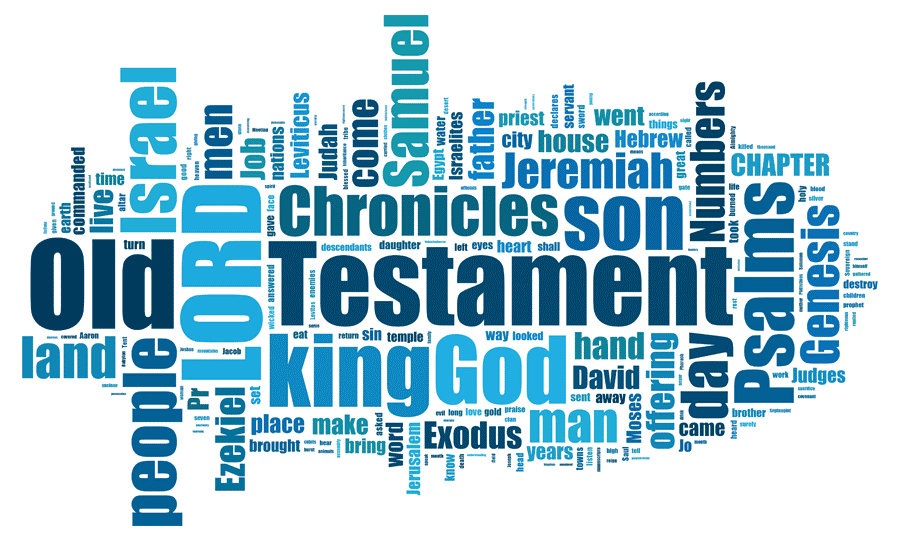Session Eight - Great Individuals in the Old Testament - People Just Like Us
Introduction
The Old Testament is alive with personality. It includes accounts of the lives of individuals, and we read about their relationships with God and one another. They lived a long time ago (David's reign was during the Iron Age), and it is doubtful that they would have contemplated their stories being recounted as part of God's revelation (in the Jewish canon) thousands of years later. But "there is nothing new under the sun" (Eccl 1:9). People of every generation are similar (the Wisdom Books are relevant today). Their stories have been preserved for us over the centuries and remain a source of teaching.
Elijah the Prophet - Just Like Us
Old Testament characters were just like us. Even Elijah, regarded by many as the archetype of the Old Testament prophets is described this way:
"Elijah was a man just like us" (James 5:17).
Elijah was a prophet of God, but even so he was a fallible, mortal, limited human man. And yet, when he prayed that it would not rain, it didn't rain. Of course, neither James' readers nor modern Christians easily think of Elijah as just an ordinary man. He was used by God to do amazing, miraculous things. This is exactly the point that James' is making. Elijah's power came from God, in response to Elijah's prayers. If Elijah was just like us, we can approach God, faith and life from the same perspective.
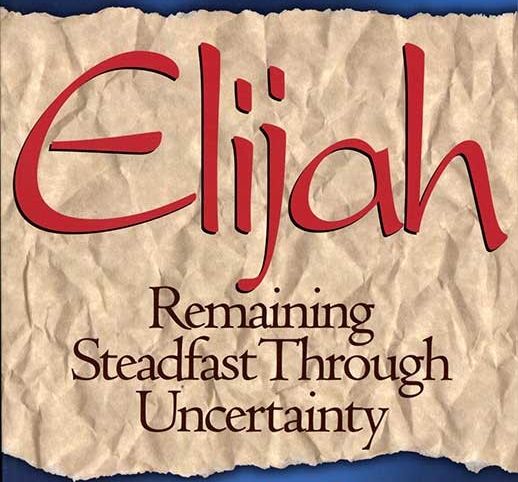
Ordinary man. Extraordinary God.
Paul wrote,
"Everything that was written in the past was written to teach us, so that through endurance and the encouragement of the Scriptures we might have hope" (Romans 15:4).
Paul's references in Romans (and his other letters) are from the Old Testament. It is true that Christians have died to the law in Christ and have been released from obligation to obey the law (Romans 7:4-6). That does not mean, however, that the scriptures from the "former days" have stopped being valuable. Paul insists that those older Scriptures were written to teach Christians, not only those who read them in the former times. They are for us, too, to bring encouragement and hope to God's people in every generation. They help us to endure, even in and through suffering. This verse serves as an answer to modern Christians who ask, why even bother to read the Old Testament? Regardless of age, those writings remain the revelation of the heart of God. The fact that we have been freed in Christ from following the law does not stop the OT from being the Word of God, full of truth, wisdom, lessons, and great encouragement for Christian believers. Paul insists that we place value on the Scriptures and seek encouragement and hope from them.
There is much to learn from studying how the experiences of OT individuals ("people of old", Heb 12:2 - that's an understatement) were touched by God, how they responded to Him, what kinds of people they became, and what marks they left on their times.
Old Testament Heroes of the Faith - Hebrews Chapter 11
Hebrews Chapter 11 is often called the "Faith Hall of Fame." The writer introduces an impressive list of heroic figures from the Old Testament - remarkable men and women whose stories stand out to encourage and challenge their faith. Some of these heroes of the Bible are well-known personalities, while others remain anonymous.
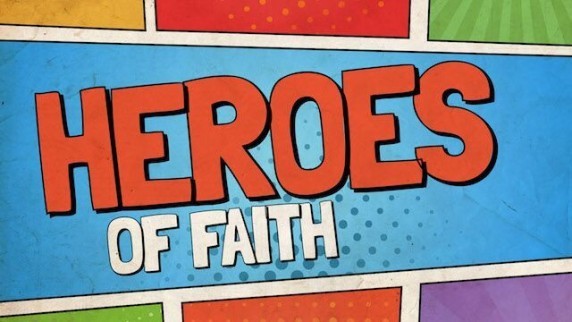
| Name | Lessons (based on the text of Hebrews 11) |
|---|
| Abel(second generation in the human story) | Abel brought a more acceptable offering to God than his brother Cain did. His offering gave evidence that he was a righteous man (ie in right standing with God); God showed His approval of Abel's gifts. He still speaks to us by his example of faith.
We do not know when these offerings began; both Abel and Cain knew the requirements, but only Abel lived up to them. The offerings remind us of the "faith versus works" dichotomy.
|
| Enoch (the man who did not die) | Enoch "disappeared", because God took him. He was known as a person who pleased God. He did so as a life of faith. "without faith it is impossible to please God. Anyone who comes to Him just believe that He exists and that the rewards those who sincerely seek him".
|
| Noah | Noah built a large boat to save his family from the flood. He obeyed God, who warned him about things that had never happened before. By his faith Noah condemned the rest of the world, and he received the righteousness that comes by faith.
Noah was known to be a righteous man. He was blameless among the people of his time. This does not mean Noah was perfect or sinless, but that he loved God with his whole heart and was fully committed to obedience. Noah's life - his singular, unshakable faith in the midst of a faithless society - has much to teach us today.
|
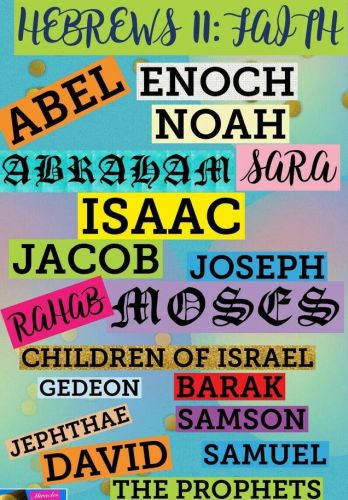
|
| Abraham | Abraham obeyed when God called him to leave home and go to another land that God would give him as his inheritance. He went without knowing where he was going. And even when he reached the land God promised him, he lived there by faith - for he was like a foreigner, living in tents. And so did Isaac and Jacob, who inherited the same promise. Abraham was confidently looking forward to a city with eternal foundations, a city designed and built by God.
Abraham offered Isaac as a sacrifice when God was testing him. He had received God's promises and was ready to sacrifice his only son, Isaac, even though God had told him, "Isaac is the son through whom your descendants will be counted." Abraham reasoned that if Isaac died, God was able to bring him back to life again. And in a sense, Abraham did receive his son back from the dead.
The New Testament cites Abraham as a man of faith whom we can emulate. Paul described him this way:
- "Abraham believed God, and it was accounted to him for righteousness" (Rom 4:3)
- "Who, contrary to hope, in hope believed, so that he became the father of many nations, according to what was spoken, 'So shall your descendants be.' And not being weak in faith, he did not consider his own body, already dead (since he was about a hundred years old), and the deadness of Sarah's womb. He did not waver at the promise of God through unbelief, but was strengthened in faith, giving glory to God, and being fully convinced that what He had promised He was also able to perform" (Romans 4:18-21).
One of Abraham's most notable feats of faith occurred when he willingly obeyed God's command in Genesis 22:2: "Take your son, your only son -- yes, Isaac, whom you love so much -- and go to the land of Moriah. Go and sacrifice him as a burnt offering on one of the mountains, which I will show you" (NLT).
Abraham was prepared to slay his son, on whom all of God's promises rested, while trusting God to either resurrect him from the dead or provide a substitutionary sacrifice. At the last minute, God intervened and supplied a ram. At first glance, the death of Isaac would have contradicted every promise God had made; Abraham's willingness to give up his son is one of the most dramatic examples of faith and trust in God found in the entire Bible. His faith was based on his absolute belief that God was able to raise Isaac from the dead.
|
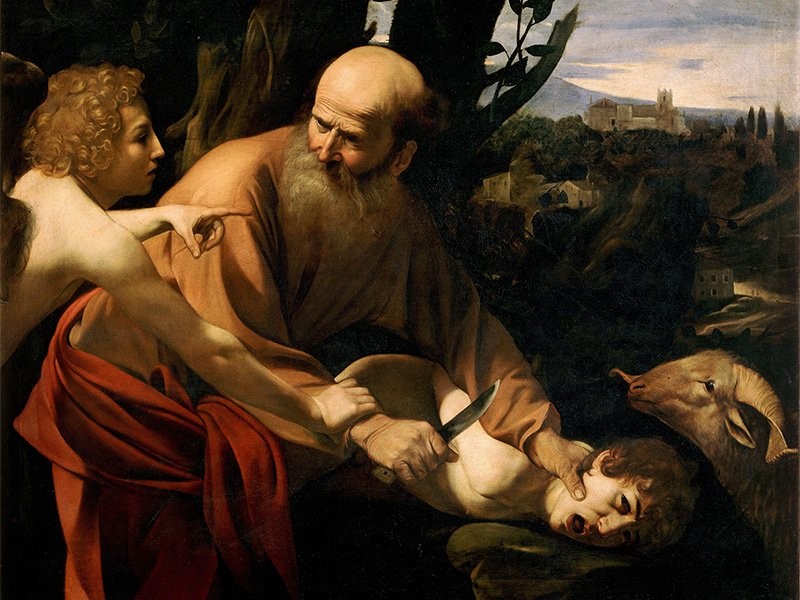
Abraham's Test
|
| Sarah (Abraham's wife) | Sarah was able to have a child, though she was unable to have children and was too old. She believed that God would keep his promise. And so a whole nation came from this one man and women who were as good as dead - a nation with so many people that, like the stars in the sky and the sand on the seashore, there is no way to count them.
Sarah waited long past child-bearing age to have a baby. At times she doubted, struggling to believe God would fulfill his promise. Losing hope, she took matters into her own hands. Like most of us, Sarah was looking at God's promise from her limited, human perspective. But God used her life to unfold an extraordinary plan. Sarah's faith is an inspiration to every person who has ever waited on God to act.
|
| Isaac | Speaking in faith, Isaac promised large-scale blessings for the future to his sons, Jacob and Esau.
|
| Jacob | When he was old and dying, Jacob blessed each of Joseph's sons and bowed in worship as he leaned on his staff.
Jacob fathered 12 sons who became heads of the tribes of Israel. One of his sons was Joseph, a key figure in the Old Testament. Jacob started out as a liar, cheater, and manipulator. He struggled with God his entire life. The turning point for Jacob came after an all-night wrestle with God. In the end, God touched Jacob's hip, and he was broken, but a new man. God renamed him Israel, or "he struggles with God."
The words "as he leaned on his staff" are significant. After Jacob wrestled with God, for the rest of his life, he walked with a limp, and gave control of his life to God. As an old man and now a great hero of faith, Jacob "leaned on his staff," demonstrating his hard-learned trust and dependence on the Lord.
|
| Joseph | When he was about to die, Joseph said that the people of Israel would leave Egypt. He even commanded them to take his bones with them when they left.
After the terrible wrongs done to him by his brothers, Joseph offered forgiveness and made this incredible statement in Genesis 50:20, "You intended to harm me, but God intended it all for good. He brought me to this position so I could save the lives of many people." (NLT)
|
| Moses' Parents (Amram and Jochebed) | Moses' parents hid him for three months after he was born. They saw that God had given them an unusual child, and were not afraid to disobey Pharaoh's command that all new-born Hebrew children be killed.
|
| Moses | When he grew up, Moses refused to be called the son of Pharaoh's daughter. He chose to share the oppression of God's people instead of enjoying the fleeting pleasures of sin. He thought it was better to suffer for the sake of Christ than to own the treasures of Egypt, for he was looking ahead to his great reward. It was by faith that Moses left the land of Egypt, not fearing the king's anger. He kept right on going because he kept his eyes on the one who is invisible. It was by faith that Moses commanded the people of Israel to keep the Passover and to sprinkle blood on the doorposts so that the angel of death would not kill their firstborn sons.
Moses is one of the most striking examples of heroic faith in the Bible. He was human, headstrong, plagued by mistakes and frailties. It was his willingness (sometimes learned the hard way to obey God despite his flaws that made Moses someone God could use. He got to know God personally, "(God) revealed his character to Moses" (Psalm 103:7).
|
| People of Israel (first generation out of Egypt) | The people of Israel went right through the Red Sea as though they were on dry ground. But when the Egyptians tried to follow, they were all drowned.
|
| People of Israel (born in the wilderness) | The people of Israel marched around Jericho for seven days, and the walls came crashing down.
Against overwhelming odds, Joshua led the people of Israel in their conquest of the Promised Land, beginning with the unusual and miraculous battle of Jericho. His strong faith caused him to obey, no matter how illogical God's commands might seem. Obedience, faith, and dependence on the Lord made him one of Israel's finest leaders. Joshua set an example for us to follow.
|
| Rahab (a prostitute in Jericho) | Rahab was not destroyed with the people in her city who refused to obey God. For she had given a friendly welcome to the spies.
Rahab's inclusion here is remarkable. Before she recognized the God of Israel as the One true God, she made her living as a prostitute in the city of Jericho. On a secret mission, Rahab played an important role in Israel's defeat of Jericho. She is honoured twice in the New Testament, as one of only five women spotlighted in the lineage of Jesus Christ in Matthew 1:5.
|
| Gideon, Barak, Samson, Jephthah - Judges | Some overthrew kingdoms, ruled with justice, and received what God promised them.
Gideon is a fascinating Bible character almost anyone can relate to. Like many of us, he was plagued with doubts and acutely aware of his own low status and weaknesses. In spite of Gideon's inconsistencies of faith, the central lesson of his life is clear: God can achieve tremendous things through anyone who depends on Him.
Barak was a warrior who answered God's call, but in the end, a woman, Jael, received credit for his defeat of the Canaanites. Like many of us, his faith wavered, and he struggled with doubt, yet God saw fit to list this otherwise unrecognized hero in the Bible's Hall of Faith.
Samson is the most prominently featured Israelite judge. He had a call on his life: to begin the deliverance of Israel from the Philistines. On the surface, what stand out most are Samson's heroic exploits of superhuman might. The biblical account equally highlights his failures. He gave into many weaknesses and made mistakes. But in the end, he returned to the Lord. Blind and humbled, Samson finally realized the true source of his great strength - his dependence on God.
Jephthah was a great warrior, a brilliant strategist, and a natural leader of men. He proved that it is possible to overcome rejection. His story in Judges 11-12 contains both triumph and tragedy.
|
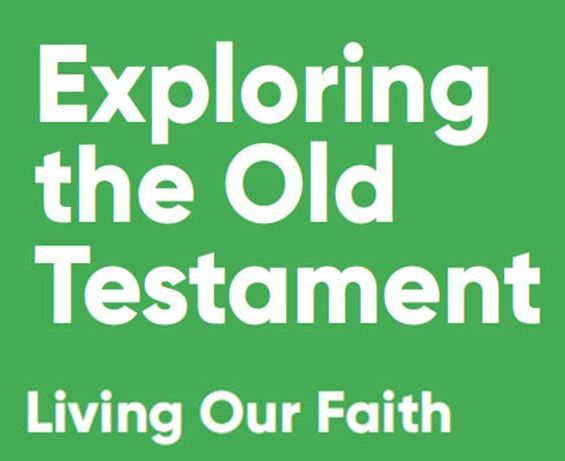
|
| David | Shepherd-boy turned king, David looms large in the pages of Scripture. This courageous military leader, great king, and slayer of Goliath was by no means a perfect role model. The Bible does not sugar coat the various accounts of his life. Although he is ranked among the most notable heroes of faith, and his life is celebrated by several religions and tourists still visit his grave in Jerusalem, David was a liar, adulterer and murderer at times. The Bible does not attempt to paint a rosy picture of David. Rather, his failures are vividly displayed for all to see.
So what was it about David's character that made him such a favorite of God? Was it his zeal for life and passionate love for God? Or was it his unshakable faith and trust in the endless mercy and steadfast goodness of God?
The book of Psalms (most of which were written by David) is full of examples of people feeling their weakness, mortality and disappointment, but encouraging themselves in God (cf 1 Samuel 30:6: "David found strength in the Lord his God").
|
| Samuel | Throughout his life, Samuel served the Lord with integrity and unwavering faith. In all of the Old Testament, few people were as loyal to God as Samuel. He demonstrated that obedience and trust are the best ways to show God that we love him.
While the people of his day were destroyed by their own selfishness, Samuel stood out as a man of honour. Like Samuel, we can avoid the corruption of this world if we put God first.
Samuel gives us a choice with a challenge: "(God says) I will honour those who honour me, and I will despise those who think lightly of me" (1 Sam 2:30).
|
| The Prophets | We have already looked at the example of Elijah. There were many others who experienced what he did and triumphed through faith in God.
|
| Others, unnamed (Good Times) | They shut the mouths of lions (eg Daniel), quenched the flames of fire (eg Shadrach, Meschach, and Abednego; Daniel 6 tells us of three Jewish boys who refused to bow down to the King of Babylon, King Nebuchadnezzar), and escaped death by the edge of the sword. Their weakness was turned to strength. They became strong in battle and put whole armies to flight. Women received their loved ones back again from death. The widow of Zarephath (1 Kings 17) and the Shunammite woman (2 Kings 4) both received their sons raised back to life by the prophets Elijah and Elisha.
|
| Others, unnamed (Difficult Times) | These men and women were tortured (Jeremiah was tortured and whipped), refusing to turn from God in order to be set free. They placed their hope in a better life after the resurrection. Some were jeered at, and their backs were cut open with whips. Others were chained in prisons. Some died by stoning (Zechariah was stoned to death), some were sawed in half (tradition holds that Isaiah died during the reign of King Manasseh by being placed in the hollow of a tree trunk and sawn in two) and others were killed with the sword. Some went about wearing skins of sheep and goats, destitute and oppressed and mistreated. They were too good for this world, wandering over deserts and mountains, hiding in caves and holes in the ground.
|
Their Limitations
All these people died still believing what God had promised them. They did not receive what was promised,
but they saw it all from a distance and welcomed it. They agreed that they were foreigners and nomads here on earth.
Obviously people who say such things are looking forward to a country they can call their own. If they had longed for the country they came from, they could have gone back. But they were looking for a better place, a heavenly homeland. That is why God is not ashamed to be called their God, for he has prepared a city for them. (Heb 11:13-16).
All these people earned a good reputation because of their faith, yet none of them received all that God had promised. For God had something better in mind for us, so that they would not reach perfection without us. (Heb 11:39, 40).
Don't say: "No one has ever seen the problems I have. No one understands. My situation is impossible". All of these "heroes of faith" lived in difficult times. Even though there were periods of victory and deliverance in Israel's history, from God's perspective the underlying problem of sin and rebellion in the nation was ongoing:
"For they have done great evil in my sight and have angered me ever since their ancestors came out of Egypt" (2 Kings 21:15).
Through faith these ordinary men and women (with an extraordinary God) had a mixture of experiences: victories as well as suffering. Some "obtained promises" in the sense that they saw the fulfillment of some of God's promises. It is clear from Heb 11:39 that none of them experienced "the promise." In His plan, "God foresaw something better for us" (Heb 11:40), ie God had in mind that the full realization of his promise of blessing and life would be experienced by us. Believers whose stories are recorded in the Old Testament, could not receive the fullness of blessing and salvation that was only going to be achieved as part of the new covenant. It is for this reason that the ancient heroes of faith did not receive in full the promise of eternal life in their lifetime, "lest they be perfected without us" (Heb 11:40). Through faith, and ultimately by way of resurrection, old covenant believers and new covenant believers alike will experience together the reward of faith, the fullness of the blessing of eternal life.

Reflection
- "Without faith it is impossible to please God". Would you describe your Christian life as a walk of faith? Not faith in faith, but faith in God. Remember the acronym: Forsaking All I Trust Him.
- All of the Hebrews 11 heroes of faith (and others not mentioned) had ups and downs in their experiences and thinking. They were all different, as are we. Can you identify with some of them?
- We cannot be effective Christians without being men and women of faith. Ask the Holy Spirit to give you a greater understanding of how to live by faith each day and in the situations you face.
- The men and women of Hebrews 11 clearly showed their resistance to temptations, disloyalty, sufferings and disappointments so that they could gain something greater and enduring. Their strong faith made them faithful to God. We pursue this same kind of faith. For only one thing matters in the long run: to know God and to obey and enjoy Him.
- Do you sometimes feel weak and limited? The Old Testament encourages us:
Let the Weak say 'I am Strong' (Joel 3:10).
